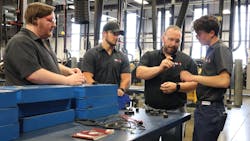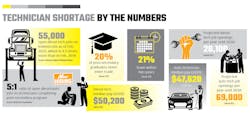How to get more diesel techs in the industry? Show 'em the money
Entry-level techs are cashing in on America’s neglect of the trades.
The technician supply chain has been stifled by societal neglect. For many decades, the trades were stigmatized as parents and teachers pushed high school graduates to universities. The culture is shifting, though. It appears high school students are less confident in a four-year degree. According to a study by ECMC Group, 71% of students surveyed in May 2020, at the beginning of the COVID-19 pandemic, said they would likely attend a four-year university, while in September 2021, that figure had dropped to 48%.
“There is definitely a push to encourage students to consider the trades more, but it’s difficult to determine exactly how many of these students that don’t attend college go to the trades,” noted Gabe Pinchev, founder and CEO of Field Service Software Co., who advises various trade industries on labor shortages. Pinchev said they may settle for retail or fast-food jobs.
But automotive and diesel careers have more to offer to those willing to do the work. Pay is at the top.
Pinchev pointed out that a technician with four years of experience can earn $50,000, and top performers get efficiency bonuses. Lately, it’s much more.
“The median income for diesel techs has been going up dramatically over the last few years,” said Gary Beeman, CEO at New Village Institute, an auto and diesel school in Pennsylvania. “It’s not uncommon to start at $65,000/year.”
Tuition for NVI-Blairsville is $25,000, with an extra $5,000 room and board cost for non-locals. The first waves of students have received grants to cover their costs and get the program off the ground
Those who pay the full tuition will still be far ahead of peers who choose the university route. “You’re about $300,000 ahead against the four-year school,” he said, factoring in the difference in tuition and working for an additional 3.5 years.
WyoTech CEO Jim Mathis concurred. “I’ve never seen it like this—the wages are incredible,” he said. “UPS out of Denver is offering our students $39/hour starting wages. That’s an $80,000-a-year job starting without any overtime. It’s pretty amazing what some of these students are offered.”
About the Author

John Hitch
Editor-in-chief, Fleet Maintenance
John Hitch is the award-winning editor-in-chief of Fleet Maintenance, where his mission is to provide maintenance leaders and technicians with the the latest information on tools, strategies, and best practices to keep their fleets' commercial vehicles moving.
He is based out of Cleveland, Ohio, and has worked in the B2B journalism space for more than a decade. Hitch was previously senior editor for FleetOwner and before that was technology editor for IndustryWeek and and managing editor of New Equipment Digest.
Hitch graduated from Kent State University and was editor of the student magazine The Burr in 2009.
The former sonar technician served honorably aboard the fast-attack submarine USS Oklahoma City (SSN-723), where he participated in counter-drug ops, an under-ice expedition, and other missions he's not allowed to talk about for several more decades.

